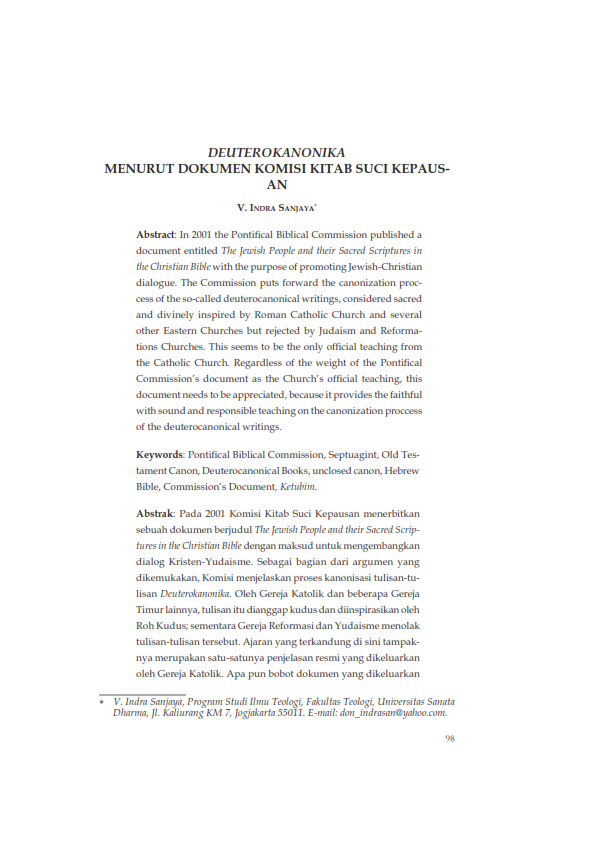Deuterokanonika Menurut Dokumen Komisi Kitab Suci Kepausan
Abstract
Abstract: In 2001 the Pontifical Biblical Commission published a document entitled The Jewish People and their Sacred Scriptures in the Christian Bible with the purpose to promote Jewish-Christian dialogue. As part of the arguments, the Commission puts forward the canonization proccess of the so-called deuterocanonical writings, considered sacred and divinely inspired by Roman Catholic Church and several other Eastern Churches and rejected by Judaism and Reformations Churches. This seems to be the only official teaching from the Church. Regardless the weight of the Pontifical Commission’s document as the Church’s official teaching, this document needs to be appreciated because it provides the faithful with the sound and responsible teaching on the canonization proccess of the deuterocanonical writings.
Keywords: Pontifical Biblical Commission, Septuagint, Old Testament Canon, Deuterocanonical Books, unclosed canon, Hebrew Bible, Commission’s Document, Ketubim.
Abstrak: Pada 2001 Komisi Kitab Suci Kepausan menerbitkan sebuah dokumen berjudul The Jewish People and their Sacred Scriptures in the Christian Bible dengan maksud untuk mengembangkan dialog Kristen-Yudaisme. Sebagai bagian dari argumen yang dikemukakan, Komisi menjelaskan proses kanonisasi tulisan-tulisan Deuterokanonika. Oleh Gereja Katolik dan beberapa Gereja Timur lainnya, tulisan itu dianggap kudus dan diinspirasikan oleh Roh Kudus; sementara Gereja Reformasi dan Yudaisme menolak tulisan-tulisan tersebut. Ajaran yang terkandung di sini tampaknya merupakan satu-satunya penjelasan resmi yang dikeluarkan oleh Gereja Katolik. Apa pun bobot dokumen yang dikeluarkan oleh sebuah Komisi Kepausan ini, dokumen ini perlu dihargai karena memberikan gambaran kepada umat tentang proses kanosisasi untuk tulisan-tulisan Deuterokanonika.
Kata Kunci: Komisi Kitab Suci Kepausan, Septuaginta, Kanon Perjanjian Lama, tulisan-tulisan Deuterokanika, kanon terbuka, Kitab Suci Ibrani – Dokumen Komisi, Ketubim.

DISKURSUS applies the Creative Commons license (CC BY). We allow readers to read, download, copy, distribute, print, search, or link to the full texts of its articles and allow readers to use them for any other lawful purpose. Full information about CC BY can be found here: https://creativecommons.org/licenses/by/4.0/












